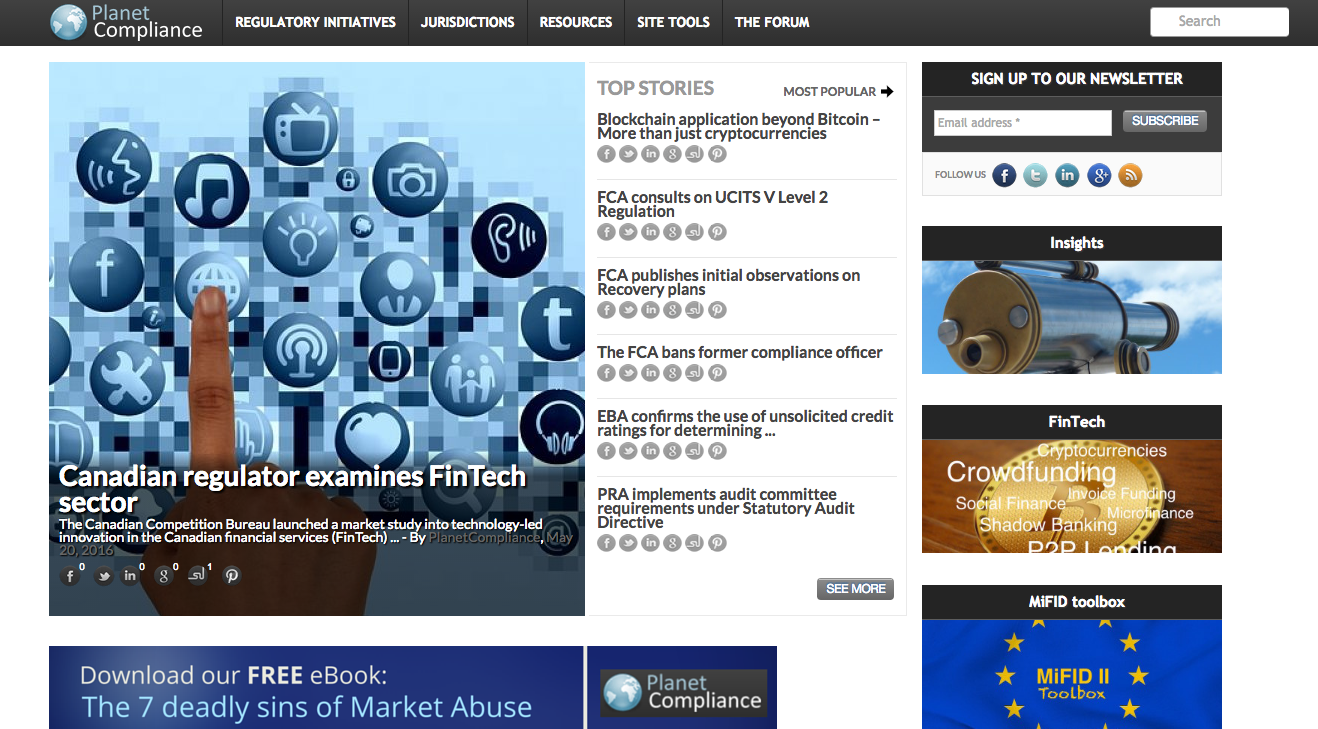

How to cope with Fintech Finance Innovation Compliance Interview With Jochen Heussner Founder of Planet Compliance
How to cope with Fintech, Finance Innovation Compliance and regulation? Interview With Jochen Heussner Founder of Planet Compliance!
Jochen is the Founder and CEO of PlanetComplicance.com. With a strong background in regulation, legal and compliance, in particular in investment banking and alternative finance Jochen is looking how finance and legal structures adapt to innovation, Fintech, Blockchain and other related areas of innovation and business and financial world. He has been working for more than ten years in Germany, France, Italy, the US and UK with international law firms, and financial institutions such as Citigroup, Fidelity International and Royal Bank of Canada. Jochen has a focus and expertise on legal subjects, management, international relations, and strategy consulting. He is a qualified lawyer, and holds a law degree from Università degli Studi di Parma, and a Master’s Degree in International Law by the University of Giessen in Germany. Jochen is part of the founding team of the new hybrid publishing and tech project BlockchainAge coming soon.
With financial institutions trying to cope with waves of new regulation and regulators struggling to catch up with innovation, Fintech, Blockchain, digital currencies it’s easy to get lost in the noise, especially for smaller institutions and FinTech startups with limited resources. PlanetCompliance.com is a digital free platform that provides news and tools to anyone who works in the financial industry or has an interest in regulation and compliance. While a lot of information is freely available in one form or the other on the Internet, their aim is to present everything relevant in one place and bring industry professionals together to talk and reflect about what matters to them.PlanetCompliance.com publishes books and reports about the state of the regulation / compliance and education resources.
Can you tell us about yourself, your background, and your education?
By trade, I’m qualified lawyer and have been working for 10+ years with law firms and financial institutions in Germany, France, Italy, the US and UK. I’m also an investor and advisor to startups and SMEs on the legal and financial side. Having worked in the field, I wanted to create something myself, so we came up with PlanetCompliance.
Can you tell us about PlanetCompliance.com?
PlanetCompliance is a free digital platform that provides news, research, and resources to anyone who works in the financial industry or has an interest in regulation and compliance. While most of the information is freely available in one form or the other on the Internet, our aim is to present everything relevant in one place. Especially with the ongoing regulatory tsunami and many sources available, it’s difficult to filter the important out of the noise and focus on the essential things.
What is your view about the compliance and legal industry in a time of advanced technology and fintech disruption?
While some might see technology and the FinTech disruption only adding to the already high workload of compliance officers, it also brings opportunities to manage it better and in a more effective way. I think it’s important to find ways to make sure that no important information is missed, without getting absolutely swamped. Technology can help with that and, in particular, in the field of RegTech exciting things are already happening.
What is the legal and compliance advice you give to Fintech companies founders and CEOs?
From a legal perspective, it is important to keep your house in order since minor mistakes there can have ruinous consequences for a startup. Luckily, there is a large offering of services and providers available to deal with the basics without running into massive costs. Regarding regulation, it is a bit trickier since the field is a little bit less served and it is often difficult to keep track of regulatory developments, even for professionals. Unfortunately, regulations can torpedo the business model of a startup like I’ve learned the hard way a couple of years ago with the Italian crowdfunding regulation and there is much more FinTech regulation to come as regulators have only started to catch up.
What is your perspective on the emergence of new digital currencies such as Bitcoin and the Blockchain tech and its legal, compliance implications?
While a lot of people might consider change through innovation as another thing to add to the pile they have to deal with, I think it actually offers a great opportunity to design better processes and make things significantly easier for institutions. For instance, the forthcoming EU regulation MiFID II will require firms to report large amounts of data, which will be very challenging for the existing setup, but thanks to RegTech it should be possible to manage these processes more efficiently. This is just one example and in the field of compliance monitoring RegTechs are already delivering. The emergence of the Blockchain for applications beyond digital currencies will even add to this and thanks to the use of smart contracts and the distributed ledger technology the framework for regulation and how we deal with it will change drastically within the next decade.
Algorithm trading is used by over 75% of all trading / investing activity at the moment. How do you see the future for algorithm trading, in terms of regulation and legal framing?
Algo trading is an excellent example and supporters and opponents argument fiercely to convince regulators around who are working to adapt the existing framework. Regardless how you think about it, Algo Trading is a reality and it is here to stay. This example highlights though that regulators did not realize its importance for too long and struggled to understand it fully, which is the crucial aspect in any regulatory initiative: do those making the rules fully understand the problem and the consequences of the rules for the respective industry? It’s, for instance, going to be interesting to see how artificial intelligence is going to further evolve in this field and how regulators respond to that.
In general, what are in your view the biggest regulatory / compliance challenges for Financial industry as a whole?
Right now, people in the EU are likely to tell you that it is MiFID II and even with its recent postponement to 2018, firms should continue the preparations at full speed. However, it is only a piece – admitted a fairly big one though – in a larger puzzle and regulatory change is an ongoing process that requires the right management of resources. Financial innovation and the rise of big data or the threat of cyber attacks will only cause regulatory responses from governments and authorities that financial firms will have to deal with.
In general, what are in your view the biggest regulatory / compliance trends?
I suppose, Governance, Risk Management, and Investor/Consumer Protection are the key trends to name here. For example, the EU continues to drive regulation towards Investor Protection with its corner piece MiFID II and the forthcoming Market Abuse legislation. Having said that with the large amount of regulatory initiatives underway one could probably name a few more easily.
How do you see these challenges / opportunities particularly in terms of the regional differences – UK, EU, US, Asia?
There is certainly room for regulatory arbitrage, i.e. exploring advantages between jurisdictions. Some jurisdictions try to gain ground using a softer touch than others, though the service regulators provide and the approach they use are also relevant. The UK’s FCA has recently made a step in the right direction with its regulatory sandbox that aims to create a ‘safe space’ in which businesses can test innovative products, services, business models and delivery mechanisms in a live environment without immediately incurring all the normal regulatory consequences of engaging in the activity in question. In the end, it comes down, however, to the markets a firm is operating in and for instance for a FinTech startup it makes little sense to solely choose a market on the basis of regulatory considerations, but it might be an important factor though.
In your opinion how should fintech companies leaders manage and prepare for the regulation / legal issues coming out of big data and cyber security
I would say that in general leaders of FinTech companies need to make sure that they are aware of the changing regulatory landscape as they could have severe consequences for the business model of a company as I have described above. I completely understand though that this can be challenging, but hopefully we at PlanetCompliance can help with that.
The post Fintech, Finance Innovation Compliance Interview Jochen Heussner Planet Compliance appeared first on Intelligent Head Quarters.

